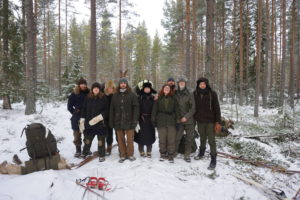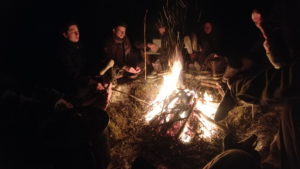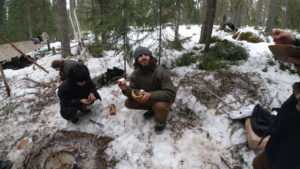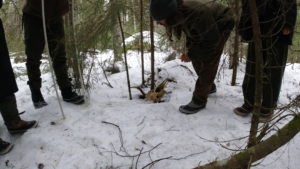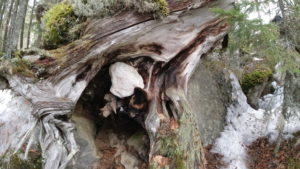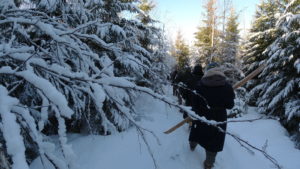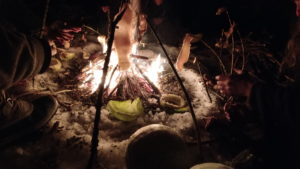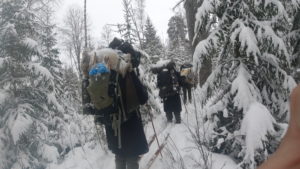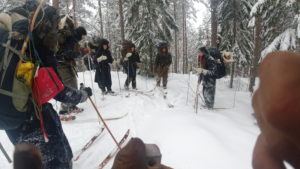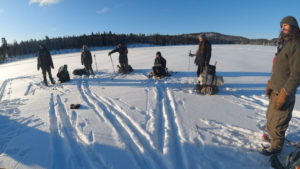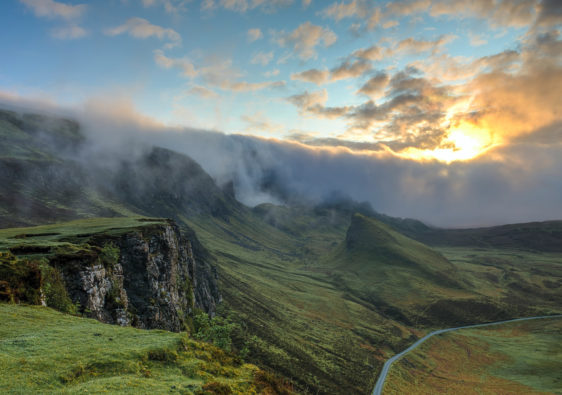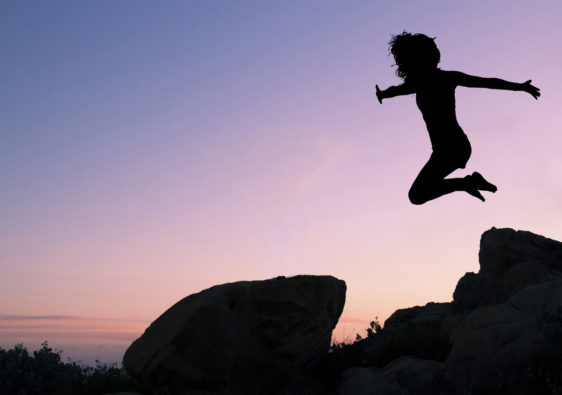Every training, every experience is different. Especially immersive trainings like the Guardian Training, that is aimed to adapt to the needs of each unique set of people being a part of it. And for each person, it is a very different experience.
It was our third training like this in total, and the second time we focused specifically on wolves and our connection to them and what we can learn from them. Two turns of the seasons ago, we were lucky enough to follow a wolfpack through their territory for basically the whole time of the immersion. Being on a mission and having a very clear focus. This time was very different. And it had a lot to do with letting go of expectations.
Becoming Wolf without wolves?
Before the immersion started, it looked like we might not be able to find any sign of wolves. The area that had been home to at least four individuals only a few moon-cycles before the immersion seemed to have emptied out. It could be, that there was simply nobody out there at the right time to find the tracks, or they moved on. Another reason might be that they got poached, which is sadly something that happens more often than you think. So when we found some sign of wolf activity in a more distant area, we jumped on the opportunity. One of the Guardian traits is to always be prepared to act or react at a moment’s notice. So that’s what we did.
And we were generously rewarded. Only a few moments after we had left the road where we had been dropped off, we stumbled upon rather fresh tracks. They couldn’t have been older than one and a half sun-cycles. The tracks allowed us a great puzzle. Was it lynx or was it wolf? How could you distinguish between feline and canine?
Following the tracks for the rest of the sun allowed us even more insight. We could observe moving patterns, count individuals, and they led us to some more tracks. Showcasing really nicely how the lynx we had been following differed from the wolf tracks we encountered on the second sun.
“We will just find tracks everywhere”
The first few suns had gifted us with so many tracks, that it was hard not to believe, we could abandon them and find new ones anyway. So after three suns the pack decided to abandon the tracks to find a good camp spot. And… we never found tracks again for the rest of the training. Reminding us, not to take anything for granted.
But that didn’t mean we couldn’t become wolf. After all it wasn’t a tracking or trailing workshop, but a Guardian Training. And one of the Guardian mottos are “life is training, and training is life”. So whenever there is no mission. we use the time for training. To grow stronger and more resilient as individuals and as a group.
“There is firewood everywhere in the forest”
Yet another bubble that was burst, was the pretty common idea, that we would just find firewood everywhere in the forest. It’s full of trees after all, right? Well, not really. Not every type of tree is a good source of firewood, and not every stage of a tree’s life (and death) is really suited either. also, being in someone else’s forest doesn’t allow us to cut down standing dead trees or bigger trunks either. So finding a good spot for decent firewood, especially wood that we’re also allowed to take, and enough of it, is an important skill to learn.
Super stealthy all the time
A training like this will be a high-level scout training where we would be in mission mode all the time. Right? well, … ‘plop’. Sorry to burst another bubble. While this is something we are definitely aiming for, we were a very mixed group with different levels of experience, awareness, and – yes – expectation. Just as much as this was not a tracking workshop, it also was not set up to be an elite scout training, but an entry level Guardian Training. Being on such an alertness level for such a long time is like asking someone to run a marathon without any training.
And for Guardians – as much as they aim to be unseen, unheard and in the shadows – there is another skill, that needs to be mastered in combination with stealth training: to work together seamlessly in a group. And for that, we need to find our combined mission and focus.
The clear mission
Letting go of expectations and coming with an empty bowl doesn’t mean that we lower our standards and let go of our values. To create a strong mission statement is key to not fall into the trap of lowest common denominator. So when the pack formed their mission statement, and decided to give away the cooking pot to face their next group challenge, new, powerful energy was released.
This is the mission statement that our pack came up with together: “Providing protection for the wolves by our presence, learning outdoor skills and having wolves as our inspiration to learn about group dynamics and grow”.
Over-excitement and reality-check
In our modern society, we take a lot more for granted than we realize. Something as simple as a pot can reduce the cooking effort by a lot more than you might realize. And not having one may lead to a lot of frustrated, hangry and freezing pack members… And going through this experience, the pack learned, how setting the right priorities is one of the most essential skills when being out in nature for a longer period of time.
Self care vs. false comfort
Being out in nature and wanting to function at the top of our capabilities not only asks us to be trained in a specific skill, but to know and be able to take care of our most basic needs, while being aware of the false comfort trap. Sometimes we ignore our real needs of keeping our feet and hands warm, having enough food to produce heat, sleeping enough, drinking enough, or washing ourselves, while getting caught up in thinking that we need to rest, eat comfort foods, chat about this and that, or rely too much on the rest of the group taking care of common tasks.
Those seemingly “dumb” or mundane things have one of the biggest impacts during an immersion like this. And even though they might not be big issues in our civilized lives, they show us a clear path to some of the more dysfunctional patterns we bring along.
Waiting
Some of the pack members might say that our training was a lot about waiting. There usually are some that are faster, and others that are slower within every group. And depending on the task, those people can change – which also was the case this time. But waiting is a product of our civilized compartmentalization. When we’re faster, it might not mean that the others are too slow and need to train more so that we don’t have to wait. It might also not mean that we simply need to adapt to the others and become slower.
Situations like those are rather an invitation for our creativity to fill it up with helpful, productive or useful things to do, while at the same time raising an awareness for the group, and finding ways to support the others, if the slowness is a sign of not functioning.
We might have the expectation, that it’s the other’s responsibility to deliver, while it might actually be the perfect opportunity for us to take responsibility for ourselves as well as finding ways to raise the level of functioning of the whole pack.
Expectations and the Guardian
All of those topics came up during our last training of Becoming Wolf. Most of them might not seem to have a lot to do with what we would expect a Guardian Training to be about. Yet those are some of the most basic things to learn and be aware of. “If we have a hammer, everything looks like a nail”. Even if we’re not aware of the hammer we’re holding. So, to sum it all up: Guardian Training has so many different aspects of training, that if you are open to it, there is always a possibility to go deeper, and let go of ideas, patterns, and expectations – while raising the overall congruency and level of whatever it is you’re doing.
